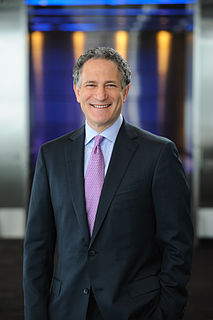A Quote by Robert F. Engle
If you pay attention to where your exposures are, you might tend up buying credit default swaps against a variety of people that you - companies that you deal with.
Related Quotes
I think the credit default swaps can take the place of the rating agencies who really have missed the ball in this procedure and are quite conflicted by the way the ratings are paid for. So, I would like to see credit default swaps become an evermore important way of understanding credit risk in the economy.
Credit card companies are jacking up interest rates, lowering credit limits, and closing accounts - and people who have made timely payments are not exempt. So even if you pay off your balance - and that's tough when interest rates are insanely high - there's a good chance your credit limit will be slashed, and that will hurt your FICO score.
Pay attention to your friends; pay attention to that cousin that jumps up on the picnic table at the family reunion and goes a little too 'nutty,' you know what I mean? Pay attention to that aunt that's down in the basement that never comes upstairs. We have to pay attention to our friends, pay attention to your family, and offer a hand.
If your skin is crawling, pay attention. If something doesn’t feel right, pay attention. If the hairs on the back of your neck prickle, if your gut clenches up, if a wave of wrongness washes over you, if your heart starts beating faster, pay, pay, pay attention. Do not second-guess yourself or rationalize anything that impedes your safety. Our instincts are the animal inside of our humanness, warning us of danger.
People tend to think that paying a debt is like going out and buying a car, buying more food or buying more clothes. But it really isn't. When you pay a debt to the bank, the banks use this money to lend out to somebody else or to yourself. The interest charges to carry this debt go up and up as debt grows.
I mean, we've always had gold bugs, but now we sort of realize that Treasure Bills might be in the same category. And we have derivatives like credit default swaps which are in this category, and we have derivatives like volatilities that are actually an asset class that we can invest in which are now - would out perform if we have another financial crisis.






























